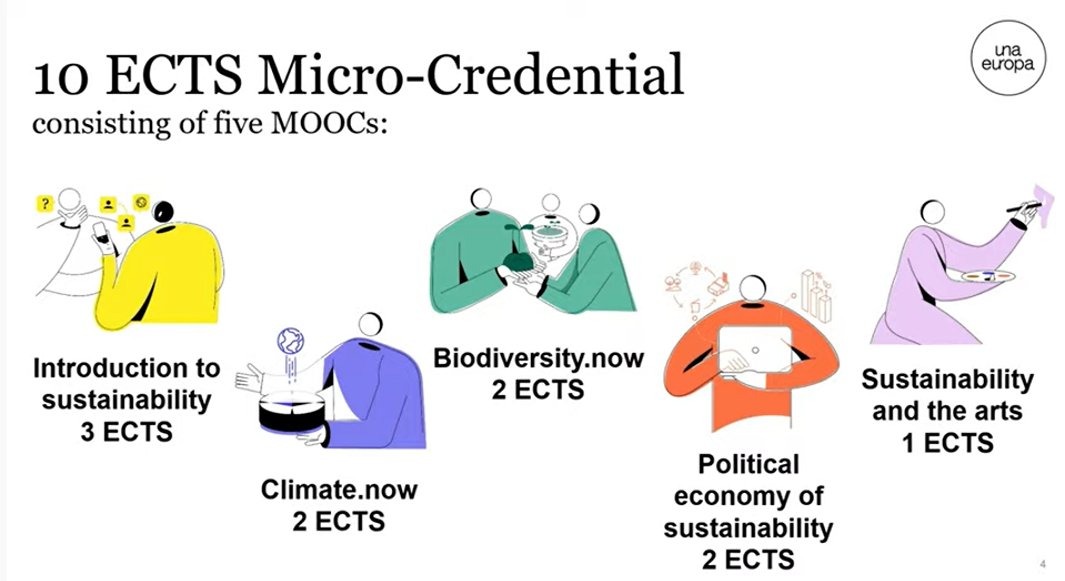We recently launched our first micro-credential programme, the Una Europa Micro-Credential in Sustainability. Dr Laura Riuttanen, University Lecturer in Atmospheric Sciences at the University of Helsinki, is the programme’s Academic Lead. Here, Laura outlines why Una Europa is leading the way in the development of joint micro-credentials – and advancing global sustainability at the same time.
Addressing climate change and the global sustainability crisis are two of the most urgent issues of our time. We need everyone to have basic literacy in the concepts of sustainability, climate change, and their interdisciplinary nature. Here are four reasons why Una Europa’s approach to micro-credentials is not only game-changing for learners today but can make a real difference in empowering the next generation of sustainability leaders in the future.
1. Learners are co-creators of learning experiences
Co-creation is essential to developing new high-quality learning experiences. If we want learners to not just consume but to truly engage with learning material, we need to shift our mindset from creating for learners to creating with learners. To help make their voices heard, we involved learners at several points in the development of the Micro-credential in Sustainability by experimenting with online workshops and user-testing. With this insight, we could shape our courses to approach topics in an engaging, learner-centred way.
2. Interdisciplinarity is at the heart of our approach
Most complex issues today are interdisciplinary by nature and demand expertise from many different fields. Sustainability is no exception. Our approach to micro-credentials is inherently interdisciplinary and allows learners to gain a multifaceted view within and beyond their own field. Through the format of the Micro-credential programme, interdisciplinary perspectives can naturally be integrated through the connections between MOOCs – for example, between climate change and political economy of sustainability.
3. We’re creating new opportunities for virtual mobility
Flexible, inclusive, and open learning opportunities are fundamental features of Una Europa’s vision of the European University of the Future. Our micro-credentials, developed jointly by leading universities from across the continent, provide innovative ways to tackle transnational issues – without having to travel. The Micro-credential in Sustainability is inherently European in its approach and offers a unique opportunity to internationalise the study offer of our institutions. We include perspectives from five Una Europa universities, enabling students to learn about and understand impact, context, and local solutions from across our continent. This advances a new level of virtual mobility that one university could not provide alone, in line with our commitment to creating sustainable, inclusive and affordable mobility opportunities to all learners.
4. Our micro-credential programmes build communities
Building learning experiences for the future demands radical collaboration and engagement, both inside and outside the university. We want to build a community of learners, collaborators and colleagues across countries, institutions and disciplines who will not only learn together but also act together. Una Europa’s approach to micro-credentials is radically collaborative and inclusive, involving Una Europa partner universities, other higher education institutions, local communities, associate partners and beyond. A well-known challenge of online learning is the lack of opportunities for interaction and participation in a learning community; we are keen to address this. As we deliver the Micro-credential in Sustainability, our goal is to engage with learners before, during and after the programme, for example through a LinkedIn peer community.
The future of learning
Una Europa’s approach to micro-credentials allows new knowledge to be created by pooling expertise and building on the complementary strengths of our universities, going beyond what would be possible within the boundaries of one discipline and one university. This is not only the future of learning but the future of solving societal problems.
The aim is not for everyone to become a climate scientist – instead, the flexible and open approach of the Una Europa Micro-credential in Sustainability is a solution with great potential to mainstream sustainability knowledge for all.
The Una Europa Micro-Credential in Sustainability is now open for registration.
Dr Laura Riuttanen (INAR – University of Helsinki) is the Academic Lead for the Una Europa Micro-credential Programme in Sustainability. Laura is a university lecturer in atmospheric sciences who has extensive experience in developing online teaching on climate change. She leads Climate University, a network of 25 higher education institutions in Finland that are co-teaching climate and sustainability courses online. Her research focuses on societal climate competencies and how they are learnt and taught.
The Una Europa Micro-Credential in Sustainability was initiated under the 1Europe project.
This article first appeared in the Una Europa blog here.
